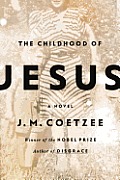 I imagine J.M. Coetze’s The Childhood of Jesus will send people scurrying through the novel frantic biblical symbol hunts. They’ll find a few tasty clues, but I doubt they’ll help plumb the depths of this fascinating book. In fact, the hints of allegory might in the end be little more than a Coetze joke. It would be better to sum up The Childhood of Jesus as the story of person with extraordinary insight and vision trapped in a prosaic world.
I imagine J.M. Coetze’s The Childhood of Jesus will send people scurrying through the novel frantic biblical symbol hunts. They’ll find a few tasty clues, but I doubt they’ll help plumb the depths of this fascinating book. In fact, the hints of allegory might in the end be little more than a Coetze joke. It would be better to sum up The Childhood of Jesus as the story of person with extraordinary insight and vision trapped in a prosaic world.
In the allegory category, look at the protagonist. He’s Simon (as in Simon Peter, you might suppose). Five year old David (as in the house of David) drops into his care from almost nowhere and Simon takes it upon himself to find the child’s true mother. For no good reason, he decides he’s found that mother in the person of a virginal lady dressed in Marian blue, takes on the role of Gabriel, and hands the child over to her. Problem for the biblical parallel? The lady’s name is not Mary, but Ines; and, virginal or not, she’s no spring chicken, has no husband, nor any desire to get pregnant. Is Coetze giving us the equivalent of an Emily Dickinson slant rhyme or just a gigantic tease? In other such examples, I noted hints of three of the four apostles, and of David’s sense of a life mission in his writing Yo soy la verdad on a school blackboard. However, only one of the apostle candidates–Juan–shows apostolic tendencies, so that parallel is a fizzle.
Oh, and then there’s the plot. When Simon takes David under his wing after a shipwreck, they find their way to a relocation center. The lingua franca of the area they’re in is  Spanish, so the official name of the center is Centro de Reubicacion Novilla, a name which would seem to be a cognate for “new,” but which really means “heifer.” The place is a socialized community that provides apartments, menial jobs and food to displaced persons. The inhabitants all accept their lot without ambition or protest (suggesting, perhaps, that the “heifer” moniker means the people are cattle-like) , which attitude drives Simon nuts. He’s possessed of a normal helping of both skepticism and striving, and is frustrated by the citizens’ passive responses to his challenges of accepted procedures and customs.
Spanish, so the official name of the center is Centro de Reubicacion Novilla, a name which would seem to be a cognate for “new,” but which really means “heifer.” The place is a socialized community that provides apartments, menial jobs and food to displaced persons. The inhabitants all accept their lot without ambition or protest (suggesting, perhaps, that the “heifer” moniker means the people are cattle-like) , which attitude drives Simon nuts. He’s possessed of a normal helping of both skepticism and striving, and is frustrated by the citizens’ passive responses to his challenges of accepted procedures and customs.
So, what’s the point of the title? Is the whole book just a giant nobel-prize-winner-put-on? Absolutely not. Coetze both demystifies and deifies the Jesus myth. David is a gifted child whose perspective on reality constantly bewilders and bedevils the adults around him. Though Simon is a great questioner relative to the other Novilla citizens, his avuncular advice to David is pretty conventional. He over and again urges him to conform, to accept circumstances because we’re all trapped in them.
David’s quite spoiled and willful, always insists on getting what he wants no matter how unreasonable. Sometimes it’s just petty childhood stubbornness (Surprise, Christ might have been human.) But often it’s a matter of his living in a personal world that’s off-center from everyone else’s reality. He knows his numbers, but refuses to put them in order. He teaches himself (almost) to read with a child’s version of Don Quixote, and he can calculate just fine when he wants to, but doesn’t reveal his skills to the frustrated adults around. He’s focused on other things, like the dangerous cracks between the numbers.
In the end, Simon, Ines, and David escape from Novilla and embark on a journey to an unknown destination. They leave to avoid officials’ attempts to incarcerate (in their view) David in a special school supposedly designed to help gifted and talented children develop their talents. Not for David. Simon seems finally to embrace David’s strange perspective, even though he understands it not at all. Ines indulges him with the blind maternal faith she’s always had.
I’ve read a few complaints about the philosophical discussions that pervade the novel, but I found them organic to the book, tied inextricably to plot, character, and action. Nothing like the confusion and abstruse discussions of Coetze’s Elizabeth Costello, which seemed impenetrable to me. No, The Childhood of Jesus is challenging, fascinating, mysterious and written in that clear, crisp Coetze prose that won him the big prize. It’s a big time winner.
